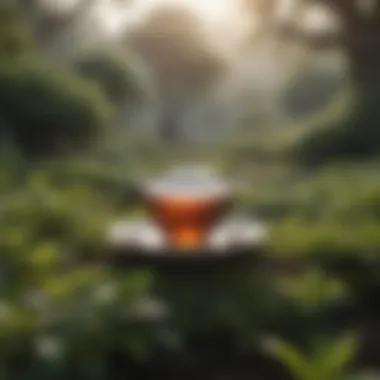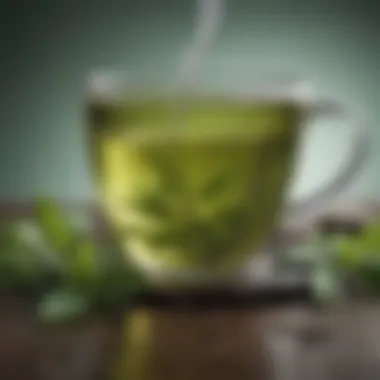Exploring Tea's Role in Alleviating Anxiety


Intro
Anxiety affects millions of people globally, often manifesting through various psychological and physical symptoms. Many individuals seek natural remedies to manage this condition, with tea emerging as a popular option. The ritual of preparing and consuming tea offers both comfort and tranquility. Teas, particularly herbal varieties, have been suggested to possess properties that may aid in reducing anxiety.
This article aims to explore the potential of tea as a soothing agent for anxiety. It emphasizes the biochemical mechanisms through which certain types of tea may act and reviews scientific literature on this subject. Through this exploration, readers can gain insight into how incorporating tea into their daily routines might contribute to a more balanced state of mind.
Understanding Anxiety and Its Impact
Understanding anxiety and its impact is crucial in the discussion of using tea as a remedy. Anxiety is a pervasive concern in today's society, affecting millions of people. It ranges from general unease to severe disorders, influencing the quality of life negatively. Highlighting how anxiety affects mental and physical health can underscore the significance of finding effective ways to alleviate its symptoms. This article explores not just how tea can serve this purpose but also the wider implications of managing anxiety effectively.
Defining Anxiety
Anxiety can be defined as a feeling of worry, fear, or apprehension. It is a natural response to stress and can even be beneficial in certain situations, such as preparing for an important exam or job interview. However, when anxiety becomes overwhelming or chronic, it may lead to anxiety disorders. These disorders can manifest in various forms, such as generalized anxiety disorder, panic disorder, or social anxiety disorder. Understanding these definitions is vital as it lays the groundwork for exploring remedies, including tea.
The Physiological Effects of Anxiety
The physiological effects of anxiety are significant. When a person experiences anxiety, the body undergoes various automatic changes. Fight-or-flight responses activate, releasing hormones such as adrenaline and cortisol. This can lead to increased heart rate, rapid breathing, and muscle tension. Prolonged anxiety can have detrimental effects on health, including weakened immune response, digestive problems, and cardiovascular issues. Recognizing these physiological reactions is essential in understanding why calming remedies, like tea, can be beneficial for those suffering from anxiety.
Long-term Consequences of Untreated Anxiety
Untreated anxiety can lead to profound long-term consequences. Without appropriate intervention, individuals may face chronic conditions that affect their professional and personal lives. Common consequences include depressive symptoms, substance abuse, relationship difficulties, and a decrease in overall life satisfaction. It is also noted that untreated anxiety can exacerbate other health conditions, creating a cycle of mental health problems. Bringing awareness to these points highlights the importance of seeking relief strategies, such as integrating calming teas into one's routine.
"Addressing anxiety not only enhances individual well-being but also improves social functioning and quality of life. A holistic approach, including remedies like tea, can make a substantial difference."
Understanding anxiety and its multifaceted impact allows for a comprehensive exploration of its management. By recognizing the definitions, physiological effects, and long-term consequences, we can start to appreciate the potential role that tea can play in alleviating symptoms.
The Role of Herbal Remedies
Herbal remedies have played a significant part in human history, providing natural solutions to numerous health problems, including anxiety. As people increasingly turn to alternative methods for mental well-being, understanding the role of herbal remedies becomes crucial. This section will discuss the benefits and considerations surrounding these remedies, particularly with regard to anxiety relief.
The usage of herbs offers a multifaceted approach to tackling anxiety. They can provide both immediate effects, like reducing stress levels, and long-term relief, including mood enhancement. Specific compounds in herbs interact with the body’s biochemistry, which can effectively modulate anxiety symptoms.
However, while herbal remedies present promising options, there are several factors to consider. The quality of the herbs, dosage, and individual responses to specific plants vary widely. Therefore, it is essential to approach herbal solutions with informed caution.
A Brief History of Herbal Medicine
Herbal medicine is not a modern phenomenon; it dates back thousands of years. Ancient civilizations, including the Egyptians, Greeks, and Chinese, used herbs for therapeutic purposes. The Ebers Papyrus, an ancient Egyptian medical text from 1550 BCE, contains over 700 remedies, many of which still resonate in contemporary herbal practices.
In the early Chinese medical traditions, herbs were integral to promoting health and treating illness. The Huangdi Neijing, or the Yellow Emperor's Classic of Medicine, is a pivotal text outlining the use of herbs for a well-rounded approach to health.
As cultures evolved, so did the understanding of herbal properties. By employing observation and experimentation, ancient healers began to catalog the effects of various herbs, forming the basis for the herbal pharmacopoeias we refer to today. This rich history underlines not only the cultural relevance of herbal remedies but also their enduring importance.
Popular Herbs for Anxiety Relief
Several herbs are noteworthy for their potential to combat anxiety. Chamomile, often enjoyed as a tea, has notable calming effects. It contains apigenin, a compound that binds to receptors in the brain, promoting relaxation.
Lavender is another well-researched herb. Its calming aroma is known to reduce anxiety and improve sleep quality. Studies show that consuming lavender, whether in tea form or as an essential oil, can effectively decrease anxiety symptoms.
Valerian root is a traditional sedative that helps with sleep disturbances associated with anxiety. Its active compounds, such as valerenic acid, influence neurotransmitter activity, which can help induce a state of calm.
Passionflower is also renowned for its anxiolytic properties. Research indicates that it may be effective in reducing anxiety levels, particularly in individuals with generalized anxiety disorder.
In summary, herbal remedies, with their historical roots and growing acceptance in modern society, offer varied avenues for reducing anxiety. By understanding their properties and potential benefits, individuals can make informed choices about incorporating these remedies into their wellness routines.


Tea Types and Their Properties
Understanding the various types of tea and their properties is crucial to comprehending how tea can help reduce anxiety. Each type offers a unique composition and specific benefits that can contribute to an overall calming effect. The selection of tea is not just about personal preference but understanding how each tea interacts with the body and mind. This section will elaborate on specific teas such as green tea, chamomile, and lavender, among others. The goal is to inform readers of the unique elements that make these teas relevant choices in anxiety management.
Green Tea
Active compounds in green tea
Green tea contains several active compounds that play a pivotal role in its effects on anxiety. These compounds include catechins, particularly epigallocatechin gallate (EGCG), which has been shown to have neuroprotective properties. Additionally, L-theanine, an amino acid found in green tea, is known for its calming effects. Together, these substances can promote a state of relaxation while enhancing cognitive function. Green tea is a popular choice due to its low caffeine content compared to coffee, making it a gentle option for those sensitive to stimulants. The unique feature of these active compounds lies in their ability to provide a tranquil yet alert state, making it suitable for daily consumption.
Evidence supporting anxiety reduction
Multiple studies exist that support the anxiety-reducing benefits of green tea. Research has demonstrated that L-theanine can effectively lower stress responses by increasing GABA levels in the brain, which is a calming neurotransmitter. Observational studies also suggest that regular consumption may correlate with lower anxiety levels among individuals. This evidence solidifies green tea’s position as a beneficial option for addressing anxiety symptoms. However, it is essential to note that the effects can vary among individuals, and not all studies may yield the same conclusive results.
Chamomile Tea
Historical uses of chamomile
Chamomile has been utilized for centuries in traditional medicine to treat various ailments, including anxiety. Cultures around the world have recognized chamomile for its soothing properties, often used as a bedtime tea to promote relaxation. This historical context adds weight to its current reputation as a calming agent. The aroma and flavor of chamomile are not only pleasant but also contribute to its effectiveness in anxiety relief. The consistency of chamomile's historical applications affirms its relevance in contemporary practices surrounding mental wellness.
Clinical studies on chamomile's effectiveness
Recent clinical studies indicate that chamomile can significantly reduce symptoms of generalized anxiety disorder. A controlled trial showed that patients who consumed chamomile extract experienced noteworthy reductions in anxiety symptoms compared to a placebo group. The calming effects are primarily attributed to its flavonoid content, which interacts with benzodiazepine receptors in the brain. Despite its proven benefits, regular consumption is often recommended in conjunction with other therapeutic methods rather than as a standalone treatment.
Lavender Tea
Calming aromas and their effects
Lavender is famed for its aromatic properties, which are believed to induce calmness. The aroma of lavender has been linked to lower cortisol levels, a hormone associated with stress. Drinking lavender tea can engage multiple senses, combining flavor with the soothing scent to create a comprehensive calming experience. This dual action enhances its appeal as a remedy for anxiety. Nevertheless, individuals react differently to scents; hence what relaxes one may be neutral or even unpleasant to another, making personal preference important.
Research findings on lavender consumption
Several studies support the effectiveness of lavender in reducing anxiety. A clinical investigation found that participants who consumed lavender oil reported lower anxiety levels and improved sleep quality. This research reinforces the potential of lavender not just as an aromatic herb but as a practical solution for those struggling with minor anxiety symptoms. While promising, excessive consumption might lead to unwanted side effects, emphasizing moderation.
Peppermint Tea
Peppermint's unique constituents
Peppermint contains menthol, a compound that offers multiple health benefits, including stress relief. This cooling element is particularly effective in easing tension in the muscles and promoting relaxation. Peppermint tea is generally caffeine-free, making it suitable for consumption at any hour. Its refreshing nature can uplift mood, making it a unique addition to any anxiety management plan. Caution should be exercised as peppermint could trigger reflux in vulnerable individuals, so consideration of personal health is necessary.
Impact on stress and fatigue
Research indicates that peppermint may also help in reducing stress and fatigue. The invigorating aroma can act as a palate cleanser for mental fatigue, helping reset focus. Its consumption is strategically beneficial during mentally taxing periods. However, like other teas, peppermint may not suit everyone, and some may not feel significant effects. Consulting with a healthcare provider may provide individualized advice for incorporating peppermint into one's routine.
Other Notable Teas
Rooibos
Rooibos, a caffeine-free herbal tea, is recognized for its rich antioxidant content. It is beneficial in overall wellness and may offer anti-inflammatory effects. For individuals concerned with anxiety, Rooibos presents a calming option that supports a well-rounded lifestyle. The unique feature is its naturally sweet taste, making it enjoyable for those who are sensitive to bitterness. However, not as widely researched as other teas, more studies are needed to fully understand its potential benefits for mental health.
Passionflower
Passionflower has a long history in herbal medicine. It is often used for its sedative properties. Some studies highlight its ability to improve sleep quality and alleviate anxiety symptoms. The unique advantage of passionflower is its versatility; it can be taken in teas, tinctures, or capsules. Despite positive findings, it may cause drowsiness, which can be a disadvantage for individuals needing alertness during the day.
Valerian root


Valerian root is primarily known for its sleep-inducing capabilities. It may reduce the time it takes to fall asleep and improve sleep quality, potentially addressing anxiety that stems from sleep deprivation. While its root has been traditionally used for centuries, clinical research is crucial to validate its efficacy fully. Potential drawbacks include possible morning grogginess and interactions with other sedatives, thus calling for careful usage.
In summary, each tea examined here has distinct elements that contribute to a greater understanding of their role in anxiety management. Whether through historical context, scientific research, or anecdotal evidence, these teas offer paths to explore for those interested in natural remedies for anxiety.
Biochemical Mechanisms at Play
Understanding how tea affects the body on a biochemical level is crucial for considering its potential in reducing anxiety. This section examines the specific mechanisms through which tea interacts with the body's systems, particularly the brain. Knowing these mechanisms provides insights into why certain compounds in tea might help alleviate anxiety symptoms, and highlights their significance in overall mental health strategies.
How Tea Affects the Brain
The role of neurotransmitters
Neurotransmitters are chemical messengers in the brain that transmit signals between neurons. They help regulate mood, sleep, and cognition, which can be influenced by the consumption of tea. One key neurotransmitter is Gamma-Aminobutyric Acid (GABA), which is known for its calming effect. Certain teas, such as chamomile, may enhance GABA's activity, thus promoting relaxation and reducing feelings of anxiety.
The ability of tea to positively affect neurotransmitter levels is significant. It translates to a mechanism by which tea can induce a sense of calmness and mental clarity. The presence of L-theanine, found predominantly in green tea, is one factor contributing to this. L-theanine enhances alpha brain waves, promoting relaxation without drowsiness. This feature makes the role of neurotransmitters particularly relevant in this discussion, given the potential to mitigate anxiety symptoms through simple dietary changes.
Impact on cortisol levels
Cortisol is a hormone produced during stress and anxiety. Its levels can indicate the body’s response to stressors. Research suggests that certain compounds in tea can lower cortisol levels, providing a direct biochemical pathway for reducing anxiety. For instance, consumption of green tea has been linked to reduced cortisol in stressful situations.
This reduction is crucial, as high cortisol levels can lead to various health issues over time, including heightened anxiety. Thus, tea not only provides immediate relief but may also contribute to long-term wellbeing by managing cortisol levels effectively. Understanding this relationship highlights the advantages of incorporating tea into daily routines as a method for stress management.
Antioxidants and Their Benefits
Tea is rich in antioxidants, particularly polyphenols and flavonoids. These compounds play an essential role in maintaining health and combatting oxidative stress, which is often linked to mental health issues like anxiety.
Polyphenols
Polyphenols are abundant in black and green tea. They have anti-inflammatory properties and support brain health. Studies suggest that polyphenols may help improve mood and cognitive functioning by protecting against neurodegeneration. Their ability to scavenge free radicals can contribute to overall brain health, making them a beneficial choice in the context of anxiety relief.
Moreover, polyphenols can influence neurotransmitter systems, potentially leading to improved mental clarity and mood regulation. Their unique feature of acting both as antioxidants and neuroprotective agents underscores their relevance in the discussion of tea's benefits for anxiety.
Flavonoids
Flavonoids, another class of antioxidants, have well-documented anti-anxiety effects. Found in almost all types of tea, flavonoids can influence brain function and neurochemistry. Their role in enhancing blood flow to the brain distinguishes them as an important aspect of tea's potential benefits. Improved circulation may enhance mood and cognitive function and help reduce anxiety levels.
Flavonoids also interact with the inflammatory pathways in the body, which can be activated during stressful events. By inhibiting inflammation, flavonoids may help lower the body’s stress response, contributing further to anxiety relief. This dual action makes flavonoids a notable component in understanding how tea can influence anxiety management.
"Tea compounds act as both a natural remedy and a preventive measure against anxiety by supporting brain health and managing stress responses."
In summary, the biochemical mechanisms at play when consuming tea provide significant insights into how it may aid in reducing anxiety. These mechanisms detail the interaction between tea's constituents and the body’s biochemical pathways, illustrating not just potential benefits but also the importance of this soothing beverage in mental health management.
Best Practices for Tea Consumption
The ways in which tea is consumed can greatly affect its effectiveness in reducing anxiety. A well-prepared cup of tea can offer more than just a soothing flavor; it can also enhance its calming properties. Understanding best practices for tea consumption helps individuals maximize the benefits of tea and integrate it into a routine. This section focuses on optimal brewing methods, recommended daily intake, and the significance of timing and rituals associated with tea drinking.
Optimal Brewing Methods
Temperature considerations
Temperature is a critical factor in brewing tea. Different types of tea require specific temperature settings to unlock their beneficial compounds. For instance, green tea is best brewed at lower temperatures, around 160 to 180 degrees Fahrenheit. This helps in preserving its delicate polyphenols and catechins, which are responsible for its calming effects. On the other hand, black tea typically needs higher temperatures, about 200 to 212 degrees Fahrenheit, to fully extract its flavors and health benefits.
Brewing tea at the right temperature is a beneficial choice for those seeking relief from anxiety. If brewed too hot, particularly delicate teas can turn bitter, which diminishes their appeal and potential calming effects. Conversely, brewing at a low temperature for an overly extended time can lead to weak flavor and insufficient health benefits. Thus, the mastery of temperature can enhance the tea's therapeutic properties and flavor profile.
Brewing timing


Brewing timing is another essential aspect to consider. Each type of tea has an optimal steeping time that influences its flavor and health properties. For example, green tea usually needs around two to three minutes, while black tea may require four to five minutes.
Following the recommended steeping times is a wise choice because it ensures that the right amount of active compounds is extracted without overwhelming the palate with bitterness or astringency. The unique feature of brewing timing is its direct correlation with the balance of flavor and health benefits. Oversteeping can release excessive tannins, leading to a less enjoyable drink.
Recommended Daily Intake
The recommended daily intake of tea varies based on individual tolerance and the specific type of tea consumed. Generally, consuming two to three cups per day is often suggested for maximizing health benefits without risks of side effects. This amount allows individuals to experience ongoing calming effects while avoiding excessive caffeine from teas like black and green.
Staying within this range provides a safe approach for those keen on managing anxiety with tea. Each cup contributes a certain dose of antioxidants which promote overall well-being. However, people should listen to their bodies and adjust intake accordingly, especially if they experience discomfort after consuming certain types of tea.
Timing and Rituals
Calming routines
Incorporating tea into a calming routine can significantly enhance its benefits for anxiety relief. Engaging in regular tea-drinking habits creates a relaxing atmosphere that can help calm the mind. Whether it's a quiet morning ritual or a soothing evening routine, the act of preparing and sipping tea encourages mindfulness. This ritual can serve as a moment of pause in a busy day, providing a break from stress and a chance to reconnect with oneself.
The unique feature of calming routines lies in their potential to create predictability, which can further contribute to reducing anxiety symptoms. Routines can instill a sense of order in one’s life.
The psychological impact of rituals
The psychological impact of rituals around tea consumption cannot be underestimated. Engaging in the ritual of drinking tea can promote a sense of well-being and tranquility. The repeated action of preparing tea and taking time to enjoy it can anchor individuals, providing a moment of solace amidst chaos.
Fostering a psychological link between the act of drinking tea and feelings of calm is beneficial. This connection can make tea consumption a therapeutic ritual that not only enhances the enjoyment of the tea but also reinforces the calming effects it is meant to provide. Establishing such rituals can be a practical tool for managing anxiety effectively.
Potential Side Effects and Considerations
In any exploration of natural remedies, it is crucial to acknowledge the potential side effects and considerations associated with their use. This section sheds light on how tea, while generally perceived as a safe option for reducing anxiety, can also elicit adverse reactions in some individuals. Understanding these elements is essential for making an informed decision about incorporating tea into a wellness regimen aimed at anxiety management.
Possible Adverse Reactions
While tea offers a range of benefits, such as relaxation and stress relief, it may lead to specific adverse reactions, often linked to individual sensitivities or the presence of particular compounds. Some common reactions include:
- Digestive Issues: Certain teas, particularly those high in caffeine like black tea, can cause stomach upset or discomfort. People with sensitive digestive systems might experience increased acidity or even nausea.
- Sleep Disturbances: Herbal teas like peppermint can aid in calming but contain compounds that may be stimulating for some. If consumed too close to bedtime, these teas may lead to difficulty falling asleep.
- Allergic Reactions: Some individuals may develop food allergies related to specific tea ingredients. Such reactions can range from mild symptoms, like skin rashes, to more severe responses, requiring immediate medical attention.
It's advised to observe how your body responds when trying a new type of tea. Monitoring is important if you introduce tea into your routine, particularly for those already managing anxiety or other health conditions.
Interactions with Medications
Another important consideration is the potential interaction of tea with commonly prescribed medications. These interactions might diminish the therapeutic effects of either the tea or the medication, leading to undesirable outcomes. Key points to be aware of include:
- Blood Thinners: Some teas, especially those containing high amounts of vitamin K, can counteract anticoagulant medications such as warfarin. This may heighten the risk of clotting or bleeding.
- Anxiolytics: Combining herbal teas that promote relaxation with prescription anxiety medications may amplify sedative effects, resulting in excessive drowsiness or impaired motor skills.
- Stimulants: Teas high in caffeine can interact negatively with stimulant medications, potentially increasing heart rate or blood pressure excessively.
It is always recommended to consult a healthcare professional before making changes to your diet or combining tea with prescribed medications.
In summary, while tea can serve as a beneficial adjunct for anxiety relief, awareness of its potential side effects and interactions with medications is vital. Always approach the use of any herbal remedy with caution, considering individual health conditions and existing treatments.
Culmination and Future Directions
The final section of this article emphasizes the culmination of insights derived from the exploration of tea as a remedy for anxiety. It allows for a holistic understanding of how various teas can contribute to anxiety management. The significance of this topic lies in its practical implications for individuals seeking natural alternatives to handle anxiety. As interest in herbal remedies grows, the framework established through this article offers valuable knowledge for both practitioners and individuals alike.
Summary of Findings
In summary, the article illustrates that specific teas, such as green tea, chamomile, and lavender, possess properties that may reduce anxiety symptoms through biochemical mechanisms. Active compounds and antioxidants present in these teas play a crucial role. Relevant scientific studies support these claims, highlighting that tea consumption can have positive effects on reducing stress and enhancing overall well-being. The detailed analysis throughout the sections forms a comprehensive overview that confirms the potential of tea in alleviating anxiety and encourages one to incorporate these beverages into daily routines.
"Incorporating tea into daily life may offer not just a moment of calm, but potential long-term benefits for mental health."
Recommendations for Further Research
While this article provides a detailed exploration, the realm of herbal remedies is vast. Future studies should focus on more extensive clinical trials to quantify the effects of various teas on anxiety. Additionally, research into the interactions of these teas with other common treatments could shed light on potential synergistic effects. Exploring how timing and quantity of tea consumption relate to anxiety reduction could also yield valuable insights. Overall, continued investigation into the chemical profiles and physiological impacts of teas will enhance the understanding and credibility of these natural remedies in the context of mental health.
As the conversation around mental health evolves, integrating ancient practices with modern scientific scrutiny can pave the way for new therapeutic strategies. Tea, with its extensive history and potential benefits, deserves a place in ongoing research discussions.



